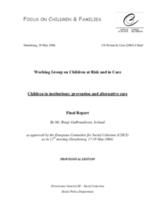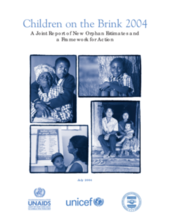Displaying 611 - 620 of 662
A comparative analysis of protection and care systems across Europe, focusing on the use of institutions, alternative forms of care placements, family support services, and the role of social workers in the process of child placement.
This paper presents a set of global policy guidelines for the protection of children without parental care. It recommends the need for a global understanding of best practices within the legal framework of the UN Committee on the Rights of the Child.
Analyzes the state of institutional care in Zimbabwe against the national child protection policy. Focuses on the role of donors in the proliferation of institutional care and strategies to better regulate the development and provision of child protection services.
An informal evaluation of an NGO residential institution in Zimbabwe, based on the opinions of the child residents. Includes recommendations for the improvement of residential care.
This report contains an overview of alternative care in Europe, the effects of institutions on children, statistical information and the different approaches of child protection systems within Europe. It includes reforming institutional care, foster care, post-care support, and the role of the social worker.
This report examines the current state of orphans and vulnerable children. It provides a regional overview, highlights trends, urges support for alternatives to institutional care and child participation, and presents a framework of protection and care of orphans and vulnerable children. Includes comprehensive data appendices.
Outlines problems and issues in providing appropriate out-of-home care solutions. Advocates for development of more comprehensive international standards for out-of-home care.
A brief fact sheet on the multilevel support needs of children without parental care. Includes a brief section on statistical data and examples of UNICEF action in several countries around the world.
This research study provides statistical information on institutional care of children under the age of 12 in Brazil. Interviews with institutions and children are conducted, and reasons for separation from family, length of time in care, status of family relationship, religious orientation and financial support of the institutions are highlighted.
This document represents the agreements made at the Second International Conference on Children and Residential Care in Stockholm, Sweden, held from 12 to 15 May, 2003. The conference was sponsored by the Swedish Foreign Ministry and the Swedish International Development and Co-operation Agency (Sida). The document includes the principles and actions, regarding children and residential care, that were agreed upon by the participants at the conference.









